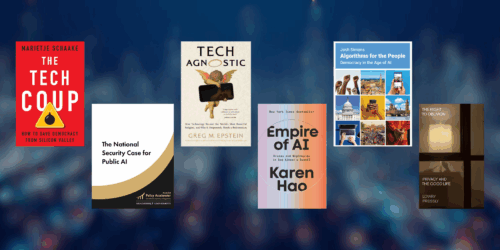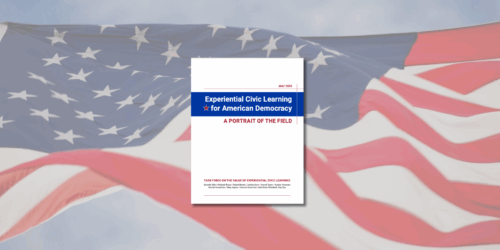At its best, digital technology makes life safer, healthier, and more empowering for people – but the products and practices of today’s largely self-governed tech industry too often limit people’s agency, undermine their economic stability, violate their rights and privacy, and do not meaningfully include them in decisions that will affect their own lives.
Research and reporting have shown that AI surveillance systems track workers’ every move, leading to workplace injuries. Corporate landlords and supermarket chains use AI and algorithms to artificially hike the costs of rent and groceries. Crypto tools, sometimes marketed as helping marginalized communities build wealth, are plagued by operational delays and hidden fees. Social media platforms surveil young people, selling their data and feeding them harmful content.
Despite these documented harms, the United States has never established rigorous governance of technology. Though public policy in a democratic society is forged in the clash and compromise between interests, American tech policy is often anchored by the narratives and norms of corporations that leverage well-financed political machinery to set the terms of debate. The result is a persistent gap in priorities, incentives, and power between a few large tech companies and the ordinary people who live with the real-world impact of their decisions.
Closing the Gap: A People’s Tech Movement
It is imperative that today’s policymakers mobilize around a new tech agenda that puts people first – a proactive vision for American society against which the nation’s leaders can measure the impact of each new advanced technology and make room for the American consumers, workers, and communities (“ordinary people”) in the innovation economy:
- What does it look like to forge a U.S. tech policy that begins with the needs of ordinary people?
- What flagship policies can return decision-making power over the role of technology in American society to ordinary people?
- What big ideas can help awaken a deeper sense of urgency and immediacy for ordinary people on these critical issues of technology and power?
- What are the most effective approaches to anchoring tech policy narratives in needs of the ordinary people, and allowing ordinary people to set the terms of policy debate?
These questions are the focus of my time as a Senior Fellow with the Allen Lab for Democracy Renovation at the Ash Center for Democratic Governance and Innovation. Through interviews, workshops, and other research, I am studying and developing policy interventions that can steer technological innovation toward agency, economic security, and opportunity for American consumers, workers, and communities. For the purposes of my research, I define these terms as follows:
- Agency: protection of the civil and human rights of ordinary people and increases their power, voice, and choice in an the innovation economy
- Economic Security: support for affordability, economic security, worker power and resilience for ordinary people in an innovation economy
- Opportunity: ensuring that individuals, communities, small businesses, and new founders can compete meaningfully in an innovation economy, and that powerful technologies are leveraged to solve the problems of ordinary people
There are substantial gaps in Americans’ understanding of how data, digital technologies, and tech governance shape daily life. My research places a special emphasis on policy interventions that capture the public imagination, as well as messaging frames that effectively tie these challenges to issues that the American public is already concerned about and organized – such as healthcare, worker rights, and individual liberties. My work draws on the interdisciplinary expertise of academic research, policy design, political strategy, communications, and movement building.
I look forward to engaging with and learning from members of the Harvard community. If you are interested in this work, please contact me at afieldsmeyer@hks.harvard.edu.
Ami Fields-Meyer is Non-Resident Senior Fellow in the Allen Lab. He served in the White House from 2021 to 2024, including as senior policy advisor to Vice President Kamala Harris.
********************************************
The views expressed in this article are those of the author alone and do not necessarily represent the positions of the Ash Center or its affiliates.






